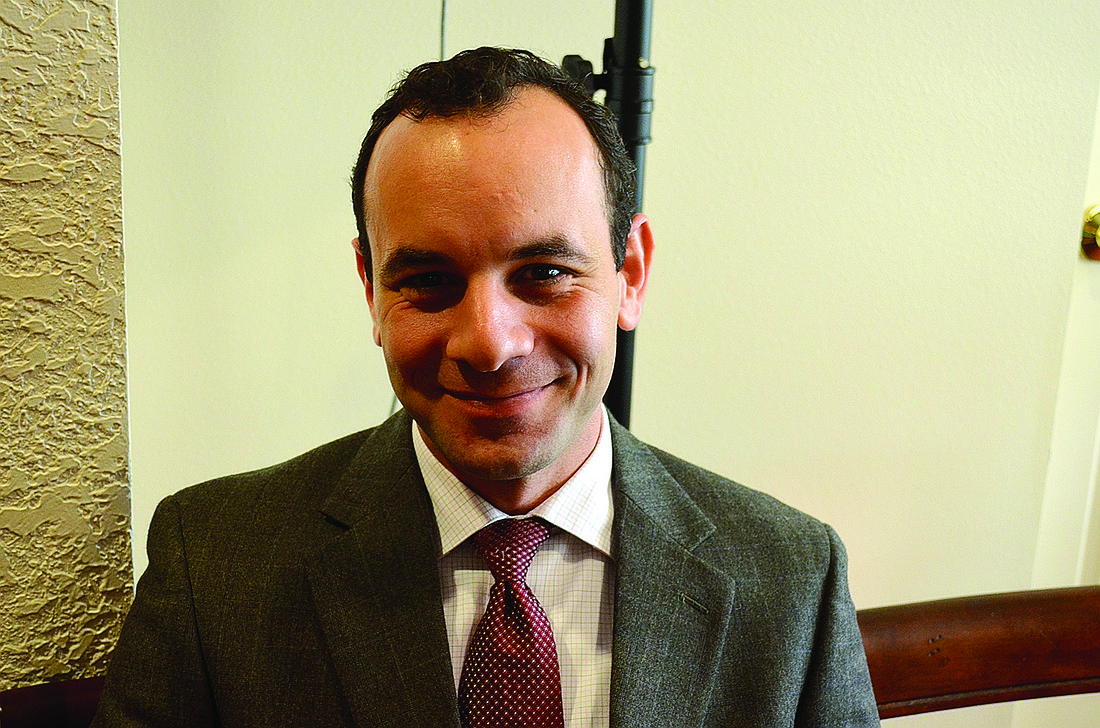- November 26, 2024
-
-
Loading

Loading

EAST COUNTY — As the one who always took care of her home and her family, Robin McCormick knew where her husband left his missing sock when he asked.
But after being diagnosed with Young Onset Alzheimer’s Disease, the woman with all the answers struggled to perform daily activities, such as getting dressed.
Receiving the news of her Alzheimer’s diagnosis prior to the age of 65 put McCormick in the Young Onset category.
With the hand of her spouse resting on her back as he stood beside her, McCormick tried to explain her “new life” to her audience during the Memory Disorders Leadership Conference March 7 at the Windsor of Lakewood Ranch Reflections facility.
She described how the mentally debilitating disease changed her life and how relying on her husband, Michael, to help her get through each day wasn’t something for which she planned.
“My status in the family, is, well... I used to be the one who took care of everybody,” McCormick said. “I was…now, he helps me. I can’t dress, so he helps me. I used to be the one. Now, I’m not the one. That’s it.”
Nine panelists, including McCormick, fielded questions on the difference between Alzheimer’s and dementia; present and future treatment or cures; and tips for individuals and families of individuals who suffer from the diseases, among other topics.
Reflections’ Sales Director Julie Gartside and panelists Dr. Michael Spellman and the Alzheimer’s Association’s Sue Fox created the panel to educate the public about facets of memory disorders and what kind of help is available to people suffering from the diseases, Gartside said.
Before answering prepared questions from moderator Sondra Guffey, Fox answered the No. 1 question she’s asked during her work at the Alzheimer’s Association: What is the difference between Alzheimer’s and dementia?
Alzheimer’s is a type of dementia that affects the patient’s ability to recognize time and space — where they are and how they got there, Fox told attendees. Dementia, overall, can affect such mental activities as remembering where items are placed and is often confused with chronic forgetfulness. Simply put, dementia is not knowing where the car keys are, while Alzheimer’s is not knowing what those keys are for, Fox said.
Dr. Andrew Keegan, a neurologist for the Roskamp Institute — a Sarasota clinic that specializes in the diagnosis of Alzheimer’s and related disorders — didn’t have such a black-and-white answer for cures and treatments.
“We’re performing clinical trials, which present the obvious frustration that, right now, there is no cure,” Keegan said. “Something we’re looking at is the idea that dementia is a diabetes of the brain, meaning the brain is becoming insulin resistant.”
Keegan also discussed the research of the theory that memory loss may be avoided by the early detection and removal of a protein that gets stuck in the brain and affects the memory.
While unsure as to when treatments or a cure will be discovered, panelist Carlton Soughton, a man with Young Onset Alzheimer’s, stressed the importance of lifestyle changes to make life easier.
Soughton sets timers — and plenty of them — on his cell phone to remind him of things he doesn’t want to forget to do each day.
He also frequently discusses his feelings with his loved ones and reminds them not to get frustrated with him because his mood and his ability to control the way he feels are out of his control.
As the panelists concluded for the day, each ended their speech on a similar note.
“Please, just remember, you’re not alone,” said Dr. Cara Yergen, a psychiatrist at Manatee Memorial Hospital, “and there’s hope.”
PANELISTS
• Tracie Adams, manager of Manatee County’s Human Services’ Aging Services Department
• Sue Fox, program specialist for the Alzheimer’s Association
• Dr. Andrew Keegan, neurologist at Roskamp Institute
• Robin McCormick, member of Younger Onset Support Group
• Donna Sobel, attorney
• Dr. Michael Spellman, psychologist with Carter Psychology Center
• Carlton Soughton, member of Young Onset Dementia Support Group
• Dr. Karim Yamout, psychologist with Carter Psychology Center
• Dr. Cara Yergen, psychiatrist at Manatee Memorial Hospital
Expert Advice
Carlton Soughton — “I have to own and accept that this disease has an affect on other people. I’m not just the victim; other people in my family and friends are the victims, too.”
Dr. Michael Spellman — “Dementia is contagious. If one person always handles the bank statements, and now can’t, but never explained to their loved one(s) how to handle that business, then they won’t know either. The disease also affects that person.”
Dr. Karim Yamout — “First, we need to be careful with the word ‘treatment.’ We’re talking about increasing the quality of life for those who live with dementia, and their loved ones. I wish we could use the word treatment as a cure, but I can’t. I wish I could.”
Dr. Cara Yergen — “Please, just remember you’re not alone, and there’s hope.”
Contact Amanda Sebastiano at [email protected].